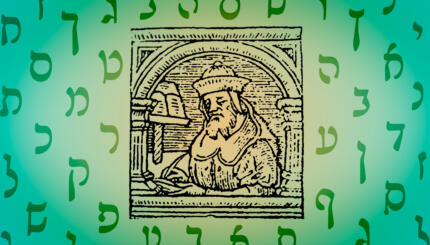The history of the beginnings of a Jewish presence in Europe cannot be thought of as a linear and continuous development. The evidence is fragmentary, random, and often inconsistent.
The earliest recorded presence of Jews in medieval Europe is that of colonies of oriental or “Syrian” merchants in towns north of the Loire or in southern Gaul during the fifth and sixth centuries. In the historians’ debate concerning the demarcation of periods, the existence of these colonies attests to the persistence of trade in the period of transition from the urban and Mediterranean world of Late Antiquity to the Middle Ages. It also indicates the contraction of commerce which was then limited solely to the import of luxury goods and carried out almost exclusively by non‑indigenous groups which inherited the role of the Greek‑speaking diaspora.
After an interruption of over 150 years, we encounter another group of Jewish merchants, new arrivals from the great centers of Jewish civilization in Palestine and Babylon. They were attracted to Europe not only by the profit to be made in distant lands but also by the policy of protection offered by the Carolingian kings who wished to encourage and control the suppliers of expensive textiles, spices, and other luxury articles consumed by the rich nobility.
In the ninth century, some of these merchants were involved in long distance trade encompassing the whole of Eurasia. From the Frankish kingdom they exported swords, slaves, and furs to the Muslim world: then, following the Silk Road to India and China and returning via Khazaria and the Slavic lands, they brought back spices and perfumes to Europe. A Muslim document refers to these great dealers as radhaniya (from the river Rhone or a region near Baghdad).

Help us keep Jewish knowledge accessible to millions of people around the world.
Your donation to My Jewish Learning fuels endless journeys of Jewish discovery. With your help, My Jewish Learning can continue to provide nonstop opportunities for learning, connection and growth.
From several sources we learn of the existence of a community of prosperous Jewish merchants, protected by imperial agents, who enjoyed the social prestige which the Christian society was willing to accord to the descendants of the people of the Bible. When Agobard, the Archbishop of Lyons, conducted an intensive campaign against the Jews, his efforts to restrict their activities all failed.
It was only after the Carolingian period, however, that the Jewry destined to be known as “ ” was formed and began to evolve its unique patterns of internal organization and cultural life. Large families, often led by rabbinical scholars, migrated from southern Europe, particularly from Italy, to establish communities in the Paris basin and the regions of Champagne and the Rhine. Quite small at first, these communities began to grow rapidly during the eleventh century. From about 4000 persons around the turn of the millennium, the number of Jews in German lands had reached almost 20,000 by the time of the First Crusade (end of eleventh century).
These new communities also dealt in long‑distance trade. The first-generation immigrants recognized hereditary monopoly rights in relations with clients–a custom borrowed from Arabic‑speaking communities such as that of Kairouan, and still practiced among Ashkenazi Jews as late as the seventeenth century. The new communities imposed internal discipline to prevent feuds between rival family firms and, while jealously guarding their independence, accepted an inter‑communal system of control and intervention to ensure peaceful relations and harmony within their diaspora.
For historians who wish to organize the sporadic and uneven history of European Jewry into a convenient formula of a succession of dominant centers, the late 11th century, “the age of Rashi” [the great medieval commentator] opens a new chapter. Henceforth, Ashkenazi Jewry would maintain its predominance in the Jewish world.
Reprinted with permission from Eli Barnavi’s A Historical Atlas of the Jewish People, published by Schocken Books.


